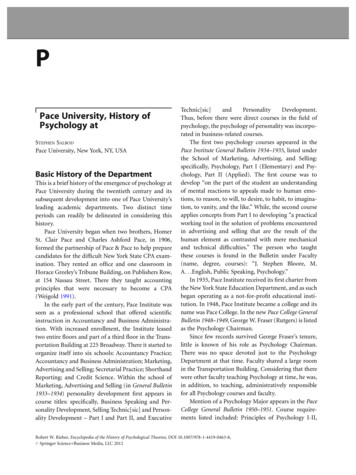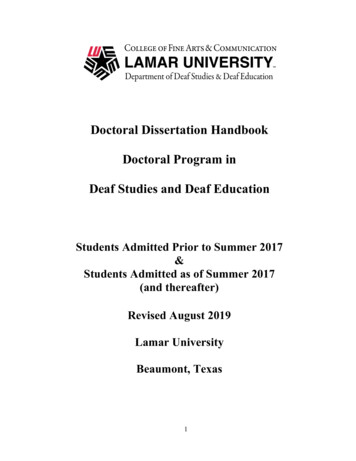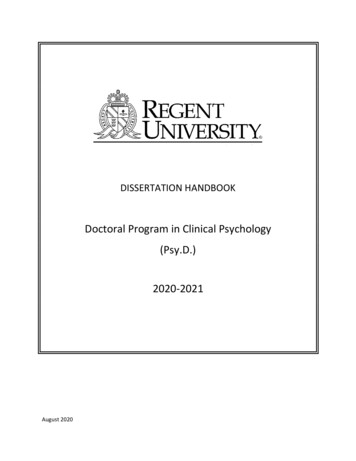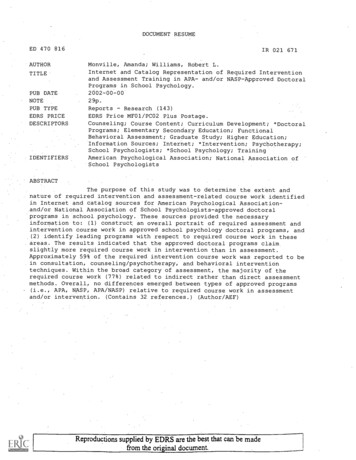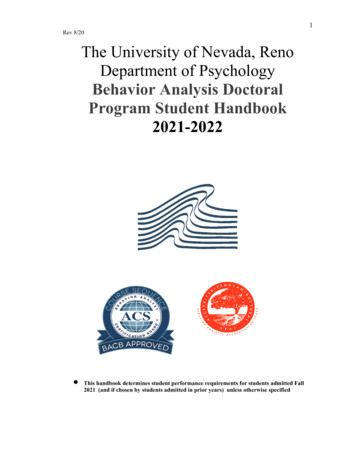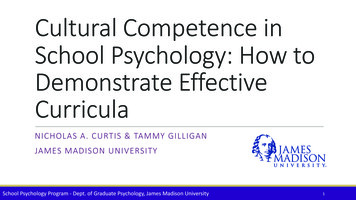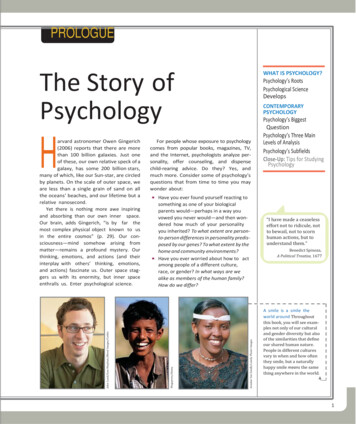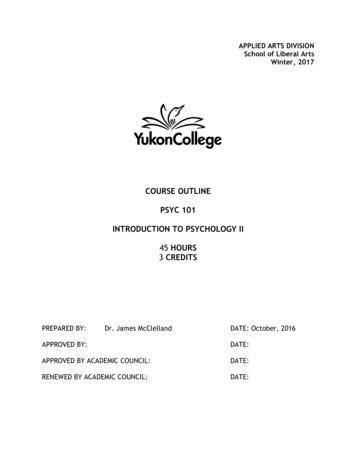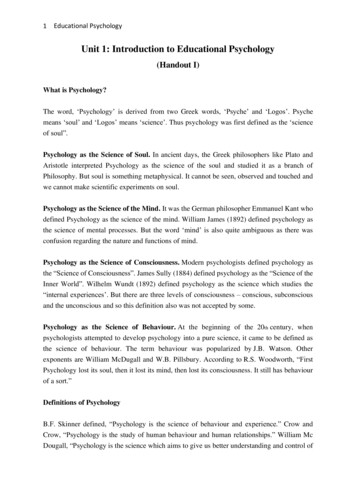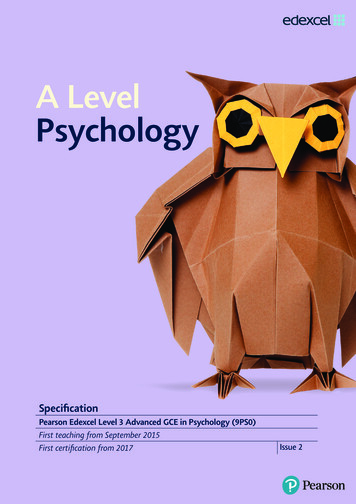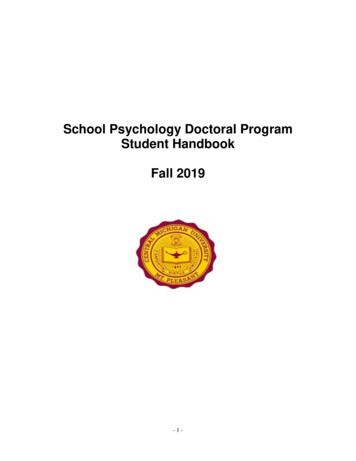
Transcription
School Psychology Doctoral ProgramStudent HandbookFall 2019-1-
August 19, 2019Welcome to the Psychology Department and the School Psychology Doctoral Program at Central MichiganUniversity. We are excited that you chose our program to achieve your professional goals. Our Ph.D. programis accredited by the American Psychological Association (APA) and is approved by the National Association ofSchool Psychologists (NASP). This Student Handbook is designed to serve as a resource, reference, and guideas you progress through the program. The handbook summarizes a number of policies and procedures that willbe directly applicable to you and your graduate education. These policies have been approved by the SchoolPsychology Program faculty. If you have any questions, please discuss them with your advisor and/or theProgram Director.From time to time, while you are a student and after you graduate, we will be asking you about yourexperiences in our program. We hope you will assist us in our program evaluation efforts so that we canimprove the quality of training we have to offer you and future students. At all times, we welcome yoursuggestions on ways to improve the program.Mike Hixson, Ph.D., Program DirectorDaniel Drevon, Ph.D., Assessment Coordinator and APA LiaisonTimothy Hartshorne, Ph.D., Admissions CoordinatorSandra Kanouse, Ph.D., SASP AdvisorKatrina Rhymer, Ph.D., Clinical CoordinatorQuestions related to the program’s accredited status should be directed to the Commission on Accreditation:Office of Program Consultation and Accreditation, American Psychological Association, 750 1st Street, NE,Washington, DC 20002. Phone: (202) 336-5979; E-mail: apaaccred@apa.org; Web:www.apa.org/ed/accreditation.-2-
TABLE OF CONTENTSTraining Model and Program Goals .4Course of Study .5Student Review Policy .9Academics .11Field Experiences .14Doctoral Comprehensive Exam .15Thesis and Dissertation .16Praxis II School Psychologist Exam .17School Psychology Certification .17Psychology Licensure .18Behavior Analysis Certification .19University Student Support Services .19AppendicesA:B:C:D:E:F:Profession Wide Competencies Linked to Courses and Assessment .20School Psychology Student Review Form (Doctoral) .21Competency Evaluation Performance Review.26Non-accredited Internship CDSPP Requirements .39Research Skill Development Assessment .40School Psychology Student Review Form (Intern) .41-3-
TRAINING MODEL AND PROGRAM GOALSThe School Psychology Program at CMU began in 1965, and at that time was the only program that offered the specialist degree (atthat time the highest degree offered by the University). We have had hundreds of students graduate from the Specialist Program andour graduates span the continent. In the late 1970s, planning began for the doctoral program. The first student graduated in 1986. In1998, the doctoral program degree offering was changed from a Psy.D. to a Ph.D.Our program demonstrates our commitment to the quality of services to school children by providing excellence in training,scholarship, and service to our community. Our curriculum is regularly reviewed to ensure that we are meeting training goals. Facultywork closely with students and ensure quality field experiences and opportunities to develop their individual interest and career path.Our faculty members are active scholars, producing a variety of quality work and providing numerous workshops to professionals atprofessional meetings and individual school districts.Our program strives to prepare school psychologists to provide consultation, intervention, and diagnostic services to children. Schoolpsychologists, by working with students, teachers, parents, administrators and community programs, promote learning environmentsin which all children and adolescents can achieve their potential. Our Ph.D. program is designed to prepare our graduates to serveeducational systems and the larger community. The program prepares school psychologists who are knowledgeable and flexibleenough to assume a variety of roles in the delivery of mental health services. Graduates of our programs work in school settings,medical centers, private practices, and universities.Training ModelThe training model is based on the scientist-practitioner tradition emphasizing the application of behavior science in educationsystems and the larger community. Training emphasizes practice (including consultation, intervention, and assessment services) andpractice evaluation in order to improve services as well as contribute to the field of school psychology. The program is committed tofostering in its students sensitivity to, appreciation for, and understanding of minority group members. Similarly, the program strivesto promote understanding of, and responsiveness to the special needs of individuals with disabilities.School Psychology involves the systematic study of the effects of social, biological, and psychological variables on students/achievement and behavior for the purposes of a) aiding in decision making regarding academic intervention, b) preventing andintervening with academic, behavioral, and emotional concerns, and c) advancing the field. Scientific knowledge enablespsychologists to have confidence and skill in their practice of school psychology and in their research. Thus, training requires thedevelopment of increasingly complex skills initially through lectures, discussion, modeling, and practice under supervision in theclassroom. Later training involves practice under supervision in the field, use of self-monitoring, and evaluation of outcomes to planfuture action. The ability to consider multiple factors that may affect learning and behavior, including student characteristics,classroom and instructional variables, and home support, is critical. Hence, a developmental ecological approach to assessment,intervention, prevention and research is stressed. Training includes various theoretical orientations such as learning theory, cognitivepsychology, and systems/ecological approaches as well as providing a strong background in the foundation areas of science.Databased decision-making is strongly emphasized along with ethical decision-making and accountability. Finally, enhancing anappreciation for diversity is critical in training school psychologists to function effectively in our pluralistic society.The Ethical Codes of the American Psychological Association (www.apa.org/ethics/code) and the National Association of SchoolPsychologists (www.nasponline.org/standards/ethics) are the foundation for the School Psychology training programs. Students areintroduced to ethical codes and ethical decision-making early (in the first semester of coursework), and they are expected todemonstrate high standards of professional conduct in coursework and field work. Consistent with our ethical codes and professionalstandards, students are taught to respect the dignity and worth of the individual, and to strive for the preservation and protection offundamental human rights. Throughout their training, students must demonstrate a commitment to using the science of psychology topromote human welfare.-4-
Based on the scientist-practitioner training model, we aim to prepare school psychologists who will work to improve the quality ofservices for children in a variety of settings. Consistent with our training model and philosophy, the School Psychology Ph.D.Program seeks to prepare school psychologists who: Use scientific knowledge as a basis for systematic problem solving, and view data collection and analysis as integral toservice delivery. Apply knowledge of assessment, instruction, learning, behavioral theory, human development, psychotherapeutic techniques,and positive mental health practices to prevent and remediate students’ learning and adjustment problems. Use professional ethical reasoning skills to make informed choices in resolving and preventing problems, respect the dignityand worth of all persons, and ensure fairness and nondiscrimination.Additionally, our program prepares all students in the Profession Wide Competencies in health service psychology identified by theAmerican Psychological Association: research, ethical and legal standards, individual and cultural diversity, professional values andattitudes, communication and interpersonal skills, assessment, intervention, supervision, and consultation andinterprofessional/interdisciplinary skills (Appendix A shows the link between the Profession Wide Competencies and our programactivities).COURSE OF STUDYThis program of study typically includes four years of intensive academic preparation and field experience plus a one-year, full-timeinternship. Students must successfully complete at least 3 years of graduate study. Students are accepted into the program on a fulltime basis. Normal progress through the program requires full-time study and will involve a course load of 9 to 12 credits persemester. Students are expected to take a minimum of 6 hours per semester. For at least one year of the program, students must be infull-time residence at Central Michigan University.Students entering with a BS/BA degree will be required to complete approximately 106 graduate credit hours. Those entering with aMA/MS degree in School Psychology will be required to complete approximately 70 graduate hours. Students are required tocomplete at least two years of academic training at Central Michigan University. The following courses must be completed whileenrolled at Central Michigan University: PSY 767, PSY 890/891, PSY 898/899, and PSY 990/991. At least 50 percent of theminimum post-baccalaureate hours for a doctoral degree must be completed at Central Michigan University. A minimum of two-thirdsof the credit hours for the doctoral degree must be at the 600 level or above, that is, no more than one-third of the credit hours may beat the 500 level. Any credits more than 10 years old at time of graduation will not be accepted towards meeting degree requirements.CoursesOur curricula reflect high standards in applied psychology. Our program emphasizes breadth of training in the foundation ofpsychology, assessment, intervention, consultation and applied research skills related to the application of behavioral science to schoolsystems. Electives are a central component in creating a specialization within the school psychology program; therefore, electivesmust be approved by the advisor.Required Courses I (9 Hours)PSY 609- History and Systems of Psychology 3(3-0)PSY 630- Advanced Social Psychology 3(3-0)PSY 687- Physiological Foundations 3(3-0)Required Courses II (3 Hours) Human DevelopmentPSY 624- Advanced Developmental Psychology 3(3-0)-5-
Required Courses III (3 Hours) Cognitive and Affective Aspects of BehaviorSelect one of the following:PSY 589- Cognitive Psychology 3(3-0)PSY 680- Learning 3(3-0)Required Courses IV (3 Hours) Multicultural IssuesPSY 850- Ethnic and Minority Issues in Therapy 3 (3-0)Required Courses V (6 Hours) Educational FoundationsPSY 677- Assessment and Development of Academic Skills II 3(3-0)PSY 760- Seminar: School Services 3(3-0)Required Courses VI (28 Hours) Assessment and InterventionPSY 562- Therapeutic Intervention: Foundations 3(3-0)PSY 605- Assessment of Affective and Behavioral Disorders of Children and Youth 3(3-0)PSY 655- Introduction to Intelligence Testing 2(2-2)PSY 656- Advanced Intellectual Assessment 2(2-2)PSY 662- Advanced Therapeutic Interventions 3(3-1)PSY 667- Assessment and Development of Academic Skills I 3(3-1)PSY 751- Psychopathology 3(3-0)PSY 766- Seminar: Consultation Skills 3(3-0)P5Y 767- Assessment and Intervention for Developmental Disabilities 3(3-1)PSY 780- Behavior Therapy 3(2-2)Required Courses VII (9 Hours) Methods and Statistics CoursesSelect PSY 611 and 612, plus one of PSY 571, 613, or 818 for a total of 9 hours:PSY 571- Research Methods in Behavior Analysis 3(3-0)PSY 611- Research Design 3(3-0)PSY 612- Applied Multiple Regression and Correlation 3(3-0)PSY 613- Multivariate and Correlational Methods 3(3-0)PSY 818- Program Evaluation 3(3-0)Required Courses VIII (3 Hours) EthicsPSY 765- Seminar: Ethics and Professional Issues 3(3-0)Thesis (6 hours)PSY 798- Thesis 1-6Required Experience-Based Courses (18 hours)PSY 790- Practicum l A: Professional Services 3PSY 791- Practicum l B: Professional Services 3PSY 890- Practicum ll A: Professional Services 3PSY 891- Practicum ll B: Professional Services 3PSY 990- Internship A: Professional Services 3-6PSY 991- internship B: Professional Services 3-6Doctoral Dissertation (12 hours)PSY 898- Doctoral Dissertation: Design 3-12PSY 899- Doctoral Dissertation: Implementation 3-12Electives (6 hours)Must be approved by advisor-6-
Total: 106 semester hoursTypical Sequence of CoursesThe following chart represents the typical sequence of courses. However, individual course of study plans will be developed with youradvisor. Sequences may change based on progress, faculty teaching loads and sabbaticals. It is important to meet regularly with youradvisor prior to registering for classes.1st YearFallPSY 667 (3)PSY 760 (3)PSY 680 (3)PSY 624 (3)SpringPSY 605 (3)PSY 677 (3)PSY 767 (3)PSY 655 (2)2nd YearSummerPSY 798 (3)PSY 656 (2)FallPSY 562 (3)PSY 780 (3)PSY 790 (3)PSY 612 (3)3rd YearFallPSY 687 (3)PSY 890 (3)SpringPSY 611 (3)PSY 891 (3)PSY 751 (3)PSY 765 (3) (3rd or4th yearSpringPSY 662 (3)PSY 766 (3)PSY 791 (3)PSY 850 (3) orMethods/StatsCourse *SummerPSY 798 (3)4th YearFallPSY 609 (3)PSY 898 (6)SpringPSY 765 (3) (3rd of 4th year)PSY 630 (3)PSY 818 (3) or Methods/StatsCourse *PSY 899 (6)5th YearFallSpringPSY 990 (3)PSY 991 (3)*Please note that 818 and 850 are typically offered every other year. They should be taken during the year they are offered.Sequencing of Doctoral Milestone EventsFirst YearFall SemesterSpring SemesterSecond YearFall SemesterSpring SemesterComplete courseworkSelect thesis topic and chairReceive formal feedback on progressDefend thesis proposalSelect Practicum SitesFBI Background Check completed (required for 790-791)*Submit Authorization of Degree FormReceive formal feedback on progressComplete courseworkImplement ThesisStudents take the PRAXIS School Psychologist Exam*Receive formal feedback on progressDefend thesisSelect dissertation topic and chair-7-
Third YearFall SemesterSpring SemesterComplete courseworkTake Comprehensive ExamReceive formal feedback on progressDefend dissertation proposalObtain information on internship sitesFourth YearFall SemesterComplete courseworkImplement dissertationComplete APPIC internship application*Interview and select internshipReceive formal feedback on progressDefend dissertationSpring SemesterFifth YearComplete internshipReceive formal feedback on progress*Additional fees required-8-
STUDENT REVIEW POLICYIntroductionThe Graduate Bulletin for the College of Graduate Studies discusses the Academic and Retention Standards for all graduate programs.This policy authorizes specific departmental requirements and particularly recognizes the special responsibilities of clinical programs.The school psychology program thus has the authority to evaluate students on the basis of their academic performance and their abilityto develop and demonstrate appropriate professional behaviors. Key training goals are ensuring that students acquire the knowledgeand skills needed to provide effective services, to demonstrate appropriate professional conduct, and to maintain public trust in thediscipline.The program faculty are committed to helping students achieve competence in key professional behaviors (e.g., effectivecommunication and interpersonal skills, critical thinking and problem solving, the use of constructive feedback for professionalgrowth) and educating trainees to engage in responsible and appropriate professional conduct (see Appendix B). Furthermore, thefaculty emphasize education and remediation of difficulties in academic performance and professional behaviors. However, if studentsdo not meet the professional standards established by the program, the College of Graduate Studies authorizes the program to place astudent on probation, or suspend or dismiss the student from the program. The following policy provides detailed information aboutthe expectations for student progress and review procedures for students pursuing graduate degrees in School Psychology. Studentrights to respond to, and provide input, regarding progress reviews (Appendix B, Appendix C) are discussed under Student ReviewProcedures. Student rights to appeal faculty program actions that affect them (e.g., program recommendations regarding probation,suspension, or dismissal) are discussed under “Program Faculty Program Actions and Student Rights,” “Academic Integrity Policyand Student Rights,” and under “Student Grievances.”Student Review ProceduresStudents will receive written feedback regarding their progress at the end of each semester during their first year and upon completionof the spring semester for subsequent years. As noted above, because of the nature of school psychology work, the evaluation processassociated with training relies not only on academic proficiency as a gauge of competence, but ethical behavior, good judgment, andother personal and professional factors associated with clinical work. The latter includes positive interactions with clients and peers,the ability to cope with work demands, and the ability to utilize supervision effectively. These ordinarily involve judgments by thestudent’s supervisors and instructors. Student review measures will include core faculty ratings of academic and interpersonal skillsvia the School Psychology Student Review Form (see Appendix B) and Practicum/Internship Supervisor ratings via the CompetencyEvaluation Performance Review (see Appendix C). In addition, student progress on milestones including thesis, comprehensive exam,and dissertation as well as their performance as a graduate assistant (if applicable) are discussed and evaluated.Expectation of ProgressStudents are expected to complete the program in five successive years. They are encouraged to work with their advisor to ensureproper progress and course selection. Progress through the program is based upon satisfactory grades, comprehensive exam, practicaand internship evaluations, completion of PRAXIS Exam (second year), and timely development and completion of the thesis anddissertation. Detailed descriptions of the comprehensive exam, PRAXIS exam, practica and internship experiences, thesis anddissertation requirements are provided later in this handbook. Students must complete all requirements for graduation within 10 yearsfrom the date of the first class completed.In terms of academic performance, students are expected to maintain between 9 and 12 hours each semester and must maintain a “B”or better overall grade average. In addition, a B or better in all assessment, intervention, consultation, practica, and internship courses;and a B- or better in all other classes. Grades in these courses are based upon satisfactory supervisor ratings and completedassignments. Timeliness of research projects, comprehensive exams, and performance as a graduate assistantship is reported by thestudent’s advisor or assistantship supervisor and include factors such as regular communication, timeliness of drafts and assignmentcompletion, data collection and analysis. Further, students must achieve satisfactory evaluations of professional functioning asoutlined in Appendix B and C (e.g., appropriate interpersonal skills, ethical, and professional conduct) by faculty and fieldsupervisors. Serious and persistent difficulties in pre-professional functioning may result in recommendation for dismissal from theprogram. The program director is responsible for checking academic performance in all courses and for composing the lettersdescribing the results of each student’s review.-9-
Scheduling of Student ReviewsA formal review of students is scheduled twice a year for the first year of the program and involves the School Program faculty whohave taught courses to enrolled students. The review takes place at the end of each semester. It focuses on general preparation andsuitability for responsibilities in practicum. Students will complete a self-assessment using the School Psychology Student ReviewForm (Appendix B) and submit to the advisor. The advisor will then complete the form and meet with the student to discuss theresults. Faculty will conduct a formal review of student progress using the School Psychology Student Review Form and the programdirector will provide written feedback individually to students. A copy of the School Psychology Student Review Form will be placedin the student’s file. The student’s advisor completes the Research Skill Development form annually (Appendix E), which evaluatesprogress toward completing the thesis and dissertation.Further reviews are scheduled at least once during each of the remaining years of the program. An unscheduled review may occurwhenever a faculty member is concerned about a student’s skill, ethical behavior or suitability (i.e., personal and professional factorsassociated with applied work). A student may request a review of his or her own work at any time.Remediation PlansIf concerns are identified about a student’s skill development, academic performance, or professional behavior as a result of thereview, the review letter composed by the program director will instruct the student to schedule a meeting with the program directorand/or his or her academic advisor to develop a written remediation plan. This written plan will identify areas in need of improvement,strategies for improvement, and expected outcomes and timelines. A copy of the remediation plan will be placed in the student’s file.If, however, the student has engaged in egregious conduct (e.g., conduct that suggests the student poses a risk to clients; grossscientific misconduct), the program faculty will follow the procedures outlined below for possible dismissal of the student from theprogram.Failure to Make Satisfactory Progress-Dismissal from ProgramAll students are required to show satisfactory progress through the program as described under “Expectation of Progress.” Satisfactoryprogress is defined as: Achieving all program requirements on a timely basis including academic, professional skills, researchrequirements, involvement in the program and profession, field-based experiences, comprehensive exam, and PRAXIS exam.Additional requirements are described in the Graduate Bulletin under Academic and Retention Standards and in the StudentReview Policy. Failure to maintain satisfactory progress may result in dismissal from the program.Program Faculty Actions and Student RightsFollowing a scheduled or unscheduled review, if in the judgment of the majority of the full time School Psychology faculty, thestudent's professional behavior or academic functioning indicates serious difficulties; one of the following actions will be considered:1. Letter of advisement signed by the Director of the School Psychology Program2. Letter deferring practicum for a period of one year or more, and/or requiring other preparation, signed by theDirector of the School Psychology Program3. Letter placing the student on probation4. Letter of intent to have the Department Chair write a letter suspending the student from the program5. Letter of intent to have the Department Chair write a letter dismissing the student from the programStudent RightsIf actions 2, 3, 4, or 5 are under consideration, the student is asked to be present at a School Psychology faculty meeting prior to anydecision. At this meeting, the student may present any relevant materials. He/she also may be accompanied by another student, facultymember, or other person in presenting his/her position.At any meeting, between the program faculty and the student, the student will be informed of the faculty’s concern and the reasons forit. The student will then be provided an opportunity to respond to these concerns and to tell his/her side of the story. The schoolpsychology program secretary will take notes of what was discussed and any decisions made at the meeting. All notes and supporting- 10 -
documents will be scanned into a password-protected confidential file accessible only to the student, program faculty, the DepartmentChair, and the Dean of the College of Graduate Studies. This file will be maintained for a period of 3 years after the student exits theprogram.After hearing whatever relevant information is available, the faculty will come to a decision based on the reasons and evidencepresented at the meeting. If there is a recommendation to dismiss, or suspend the student, a letter of intent described in number 4 or 5will be forwarded to the Department Chair. In all instances, students will be informed of any faculty decision.A decision to suspend or dismiss a student is recognized as an extraordinary action and is undertaken where, in the opinion of thefaculty, there are indications of substantial difficulties in academic performance or professional behaviors that cannot be remedied byadditional training or supervision, or if the student has engaged in egregious conduct (e.g., conduct that suggests the student poses arisk to clients; gross scientific misconduct).Appeals ProcedureIf the student wishes to appeal any program faculty action, the student may ask the Psychology Department Chair (or his or herdesignee if there is a conflict of interest) to review the School Psychology faculty’s recommendation and supporting documentationwithin ten days of the student’s receipt of the faculty decision described above. The student may schedule a meeting with theDepartment Chair (or his or her designee) who conducts an impartial appeals hearing. One faculty member from the schoolpsychology program (selected by the program) will attend this meeting. The student may be accompanied by another student, facultymember, or other person in presenting his/her position.The school psychology program secretary will take notes of what was discussed at the meeting. All notes and supporting documentswill be scanned into a password-protected confidential file accessible only to the student, program faculty, the Department Chair, andthe Dean of the College of Graduate Studies. This file will be maintained for a period of 3 years after the student exits the program.After the meeting of the Department Chair (or his or her designee), the faculty member from the school psychology program, thestudent and his or her advocate, the Department Chair (or designee) will take one of the following actions: a) forward the lettersuspending or expelling the student to the Dean of the College of Graduate Studies or b) recommend the school psychology programfaculty review and re-consider their recommendation to suspend or dismiss the student. The Department Chair may recommend thatthe school psychology program faculty re-consider their decision if, in the opinion of the Department Chair or his or her designee, thesanction is too severe in relation to the student’s academic performance or misconduct or the recommendation for suspension ordismissal appears to be a significant violation of the school psychology program’s own policies and procedures. The DepartmentChair’s concerns along with the school psychology faculty’s re-considered, but final, decision regarding suspension or dismissal willbe forwarded to the Dean of the College of Graduate Studies.ACADEMICSAdvisorsUpon admission, the Admissions Coordinator serves as the temporary advisor until the student selects a thesis chair who then becomesthe student’s academic advisor. Each student is encouraged to schedule periodic meetings with his/her advisor to review academicprogress and planning.Academic Integrity Policy and Student RightsBecause academic integrity and ethical behavior are vital to an academic environment and to the development of qualifiedpsychologists, graduate students are responsible for learning and u
PSY 780- Behavior Therapy 3(2-2) Required Courses VII (9 Hours) Methods and Statistics Courses Select PSY 611 and 612, plus one of PSY 571, 613, or 818 for a total of 9 hours: PSY 571- Research Methods in Behavior Analysis 3(3-0) PSY 611- Research Design 3(3-0) PS


